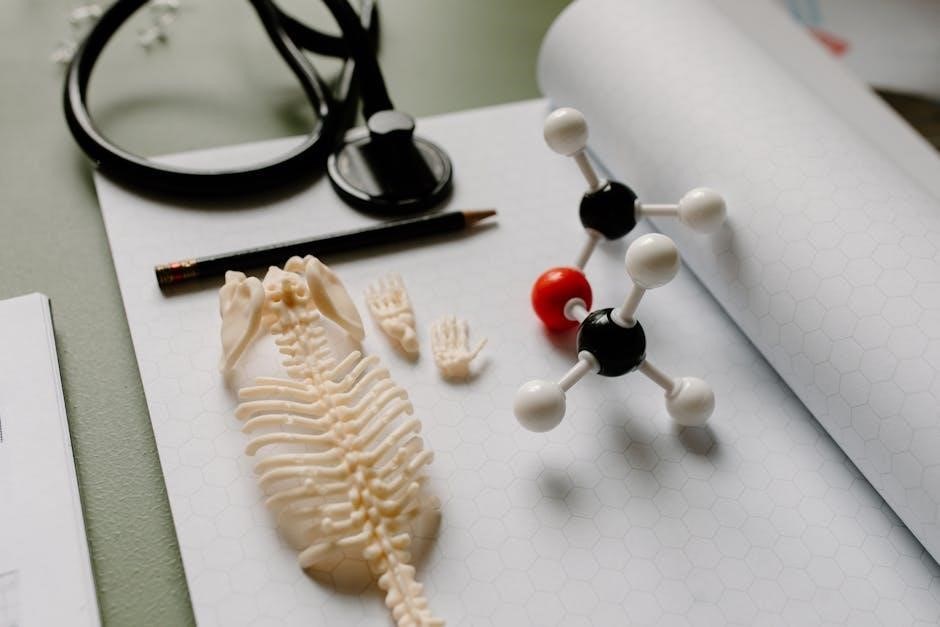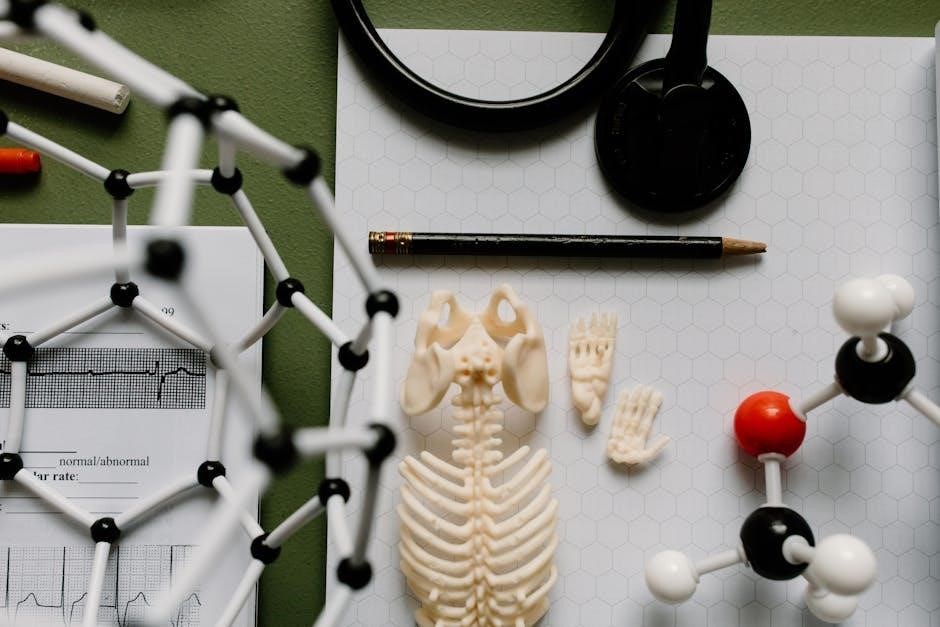study guide for nursing

Nursing study guides provide structured resources to master complex topics, offering organized content, effective strategies, and essential tools for successful exam preparation and clinical practice.
1.1 Understanding the Importance of Structured Study Materials
Structured study materials are essential for nursing students, as they provide organized content, enhance learning efficiency, and improve retention. These guides break down complex topics into manageable sections, allowing focused learning and better understanding; By identifying key concepts and prioritizing information, structured materials help students prepare effectively for exams and clinical practice, ensuring they grasp foundational knowledge while staying on track with their nursing curriculum.
1.2 Key Components of an Effective Nursing Study Guide
An effective nursing study guide includes clear objectives, concise notes, practice questions, and clinical scenarios. It should cover key terminology, concepts, and procedures, while also incorporating mnemonics and memory aids. Additionally, the guide should offer practical tips for exam preparation and clinical application, ensuring comprehensive coverage of essential nursing topics. These components work together to enhance learning and retention, helping students achieve academic and professional success in the field of nursing.

General Nursing Study Tips
Effective nursing study involves creating a study schedule, joining groups, utilizing mnemonics, and spacing repetition. These strategies enhance retention and prepare students for clinical challenges effectively.
2.1 Determining Your Learning Style
Identifying your learning style is crucial for effective studying. Visual learners benefit from diagrams and videos, while auditory learners thrive with lectures and podcasts. Kinesthetic learners prefer hands-on practice. Assessing your style helps tailor study methods to your strengths, optimizing retention and understanding of complex nursing concepts. This personalized approach ensures efficient learning and better academic outcomes.
2.2 Scheduling Study Time Effectively
Effective study scheduling involves creating a structured plan, treating study time like a non-negotiable job. Allocate specific hours for each subject, ensuring consistency and balance. Prioritize challenging topics during peak focus periods and use downtime for quick reviews. A well-organized schedule helps manage workload, reduces stress, and enhances productivity, making it easier to cover all necessary material without feeling overwhelmed.

2.3 Joining or Forming a Study Group
Joining or forming a study group fosters collaborative learning, allowing nursing students to clarify doubts, share insights, and reinforce understanding. Active participation in group discussions enhances problem-solving skills and prepares for real-world clinical scenarios. Groups can be formed in person or online, ensuring flexibility. Regular meetings and focused discussions help maintain accountability and motivation, making studying more engaging and effective for achieving academic success.

Effective Study Strategies for Nursing Students
Active studying, spaced repetition, and mnemonic devices enhance retention and understanding, helping nursing students master complex concepts efficiently while preparing for clinical practice and exams.
3.1 Using Active Studying Techniques
Active studying involves engaging deeply with material through methods like summarization, self-quizzing, and elaboration. These techniques enhance understanding and retention, helping nursing students apply knowledge effectively in clinical settings. By actively participating in learning, students can identify gaps and solidify comprehension, making study sessions more productive and focused. This approach is particularly effective for complex nursing concepts and procedures.
3.2 Implementing Spaced Repetition
Spaced repetition involves reviewing material at increasing intervals to enhance long-term retention. Nursing students can use flashcards or apps like Anki to implement this strategy. By spacing out study sessions, complex concepts like drug interactions or lab values are retained more effectively. This method complements active studying and ensures consistent progress without overwhelming the student, making it a valuable tool for mastering nursing content.
3.3 Utilizing Nursing Mnemonic Devices
Nursing mnemonic devices simplify complex concepts into memorable phrases or acronyms. For example, “RICE” (Rest, Ice, Compression, Elevation) aids in recalling injury care. These tools help students quickly grasp procedures, medications, and prioritizations. Mnemonics enhance retention and reduce study time, making them invaluable for mastering critical care interventions and NCLEX-style questions, ensuring nursing students can apply knowledge confidently in clinical settings.

Essential Resources for Nursing Students
Top resources include nursing exam guides, flashcards, cheat sheets, recommended textbooks, and online platforms. These tools provide structured study materials and practice questions for exam success and clinical preparedness.
4.1 Nursing Exam Study Guides and Practice Questions
Nursing exam study guides are essential for structured learning. They include practice questions, NCLEX-style problems, and clinical scenarios. These tools help identify knowledge gaps and improve critical thinking. Guides often feature detailed explanations, flashcards, and cheat sheets, aiding in quick revision. They focus on high-priority topics, ensuring students are well-prepared for exams and real-world applications. Regular practice with these resources enhances problem-solving skills and boosts confidence in nursing concepts and procedures.
4.2 Flashcards and Cheat Sheets for Quick Revision
Flashcards and cheat sheets are invaluable for quick, focused revision in nursing studies. Flashcards help memorize key terms and concepts through active recall, while cheat sheets condense complex information into easy-to-review formats. These tools are especially useful for last-minute preparation and reinforcing weak areas. They complement study guides by providing portable, concise resources that enhance retention and exam readiness, making them essential for efficient learning and quick reference.
4.3 Recommended Textbooks and Online Platforms
Essential nursing textbooks like Medical-Surgical Nursing by Lewis and Pharmacology by Lilley provide comprehensive knowledge. Online platforms such as Khan Academy, Coursera, and ATI Nursing Education offer interactive learning tools. These resources complement study guides by providing in-depth information and practical applications, ensuring a well-rounded education. They are indispensable for both classroom success and clinical proficiency, catering to diverse learning needs and preferences.

Preparing for Nursing Exams
Focus on class material, practice NCLEX-style questions, and use the Pomodoro method for efficient exam prep. Prioritize understanding over memorization for better application of knowledge.

5.1 Focusing on Material Covered in Class

Prioritize understanding concepts taught in lectures and clinical rotations, as exams often reflect classroom content. Review notes, textbooks, and handouts thoroughly. Identify key topics emphasized by instructors and focus on applying theoretical knowledge to real-world scenarios. Use study guides to reinforce learning and ensure you grasp foundational principles before moving to advanced topics. Regular review helps retain information effectively for exam success.
5.2 Practicing NCLEX-Style Questions
Engaging with NCLEX-style questions helps familiarize yourself with exam formats and content. Regular practice improves critical thinking, time management, and prioritization skills. Focus on analyzing question stems, identifying key terms, and selecting the best answers. Utilize online resources and practice exams to simulate test conditions, ensuring readiness for the actual NCLEX experience and boosting confidence in your problem-solving abilities.
5.3 Using the Pomodoro Method for Exam Prep
The Pomodoro Method is a time management technique that involves studying for 25 minutes, followed by a 5-minute break. This cycle enhances focus, reduces burnout, and boosts productivity. Nursing students can use this method to review notes, practice questions, or memorize key concepts. Incorporate breaks to recharge, ensuring optimal brain function during study sessions. Avoid distractions during work intervals to maximize efficiency and retain information effectively.

Maintaining Well-Being While Studying
Balancing study and personal responsibilities is crucial. Incorporate healthy snacks, regular exercise, and adequate sleep to maintain energy and focus. Avoid procrastination and stay flexible to manage stress effectively, ensuring overall well-being for academic success.
6.1 Balancing Study and Personal Responsibilities
Balancing study and personal life is essential for nursing students. Create a flexible schedule that prioritizes tasks, ensuring time for both academic and personal responsibilities. Use downtime wisely for quick reviews or relaxation. Avoid procrastination by breaking tasks into manageable chunks, and communicate with family and friends about your needs. Regular breaks and self-care can help maintain focus and prevent burnout, fostering a healthy work-life balance.
6.2 Importance of Healthy Snacks and Meals
Healthy snacks and meals are crucial for maintaining energy and focus during nursing studies. Opt for nutrient-rich foods like fruits, nuts, lean proteins, and whole grains to support cognitive function. Avoid sugary or processed foods that cause energy crashes. Keeping a well-stocked fridge ensures accessibility and prevents reliance on unhealthy options. Staying hydrated is also key for overall well-being and concentration. Nourishing your body supports your academic success and mental health.
6.4 Avoiding Procrastination and Staying Flexible
Procrastination hinders progress, so break tasks into manageable steps and set realistic goals. Stay flexible by adapting plans when needed and minimizing distractions. Utilize techniques like the Pomodoro Method to balance productivity with breaks. Prioritize tasks to maintain focus and efficiency, ensuring a healthy work-study balance that supports overall well-being and academic success.
Mastering nursing requires consistent effort, adaptability, and the right strategies. By implementing these tips, students can achieve success and build a strong foundation for their nursing careers.
7.1 Summarizing Key Takeaways
Effective study strategies, such as active learning and spaced repetition, enhance nursing education. Utilizing study guides, flashcards, and practice questions improves retention. Focusing on class material and NCLEX-style questions ensures exam readiness. Balancing personal responsibilities, maintaining a healthy lifestyle, and avoiding procrastination support overall well-being. Continuous learning and adaptability are crucial for long-term success in nursing.
7.2 Encouraging Continuous Learning and Growth
Continuous learning is vital for nursing success. Set realistic goals, seek feedback, and explore diverse resources. Stay updated on medical advancements and develop a growth mindset. Engaging in lifelong learning enhances clinical skills, adaptability, and professional development, ensuring nurses remain competent and compassionate in their evolving roles. Prioritize self-improvement to deliver high-quality patient care and thrive in the dynamic healthcare field.